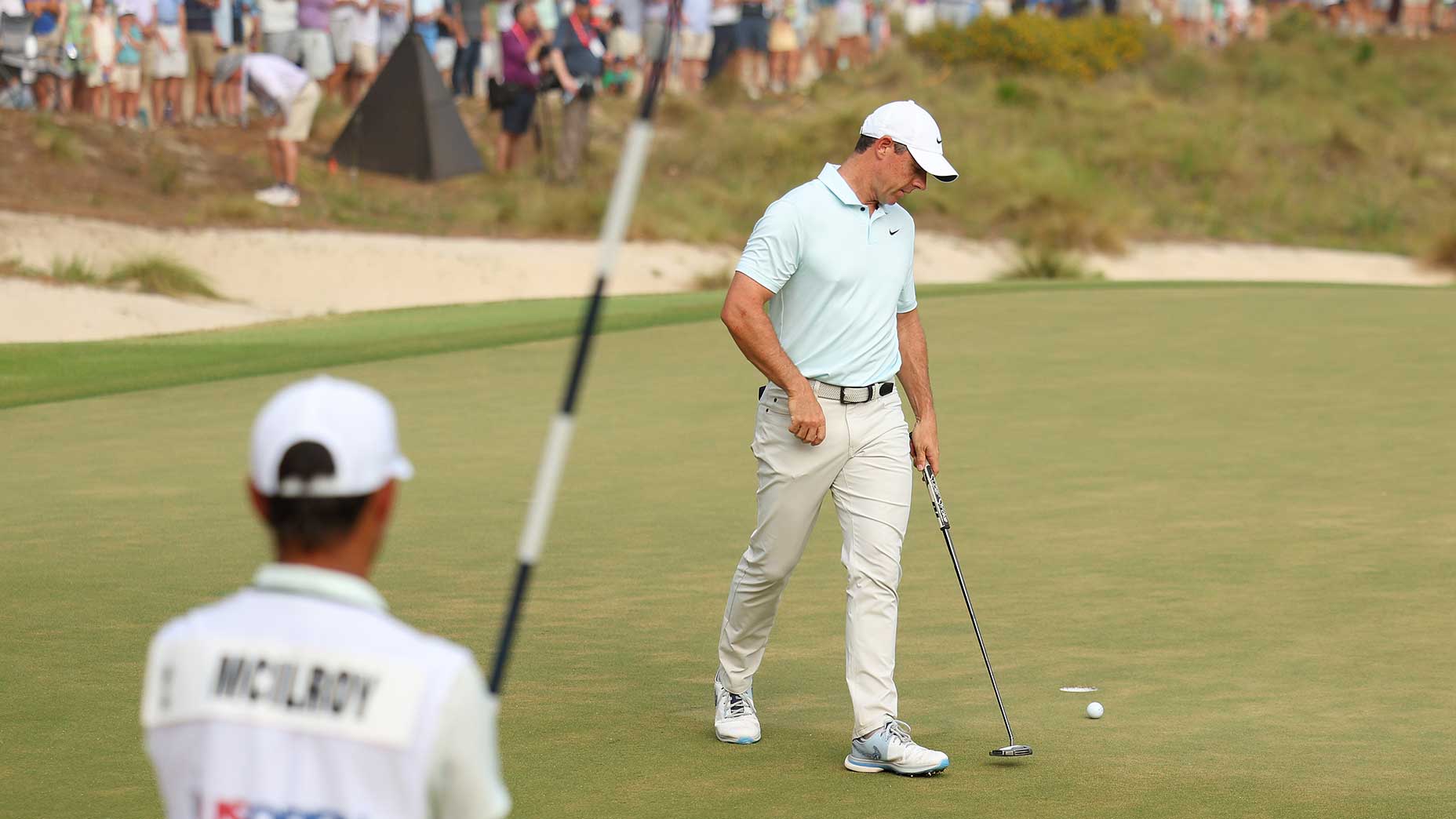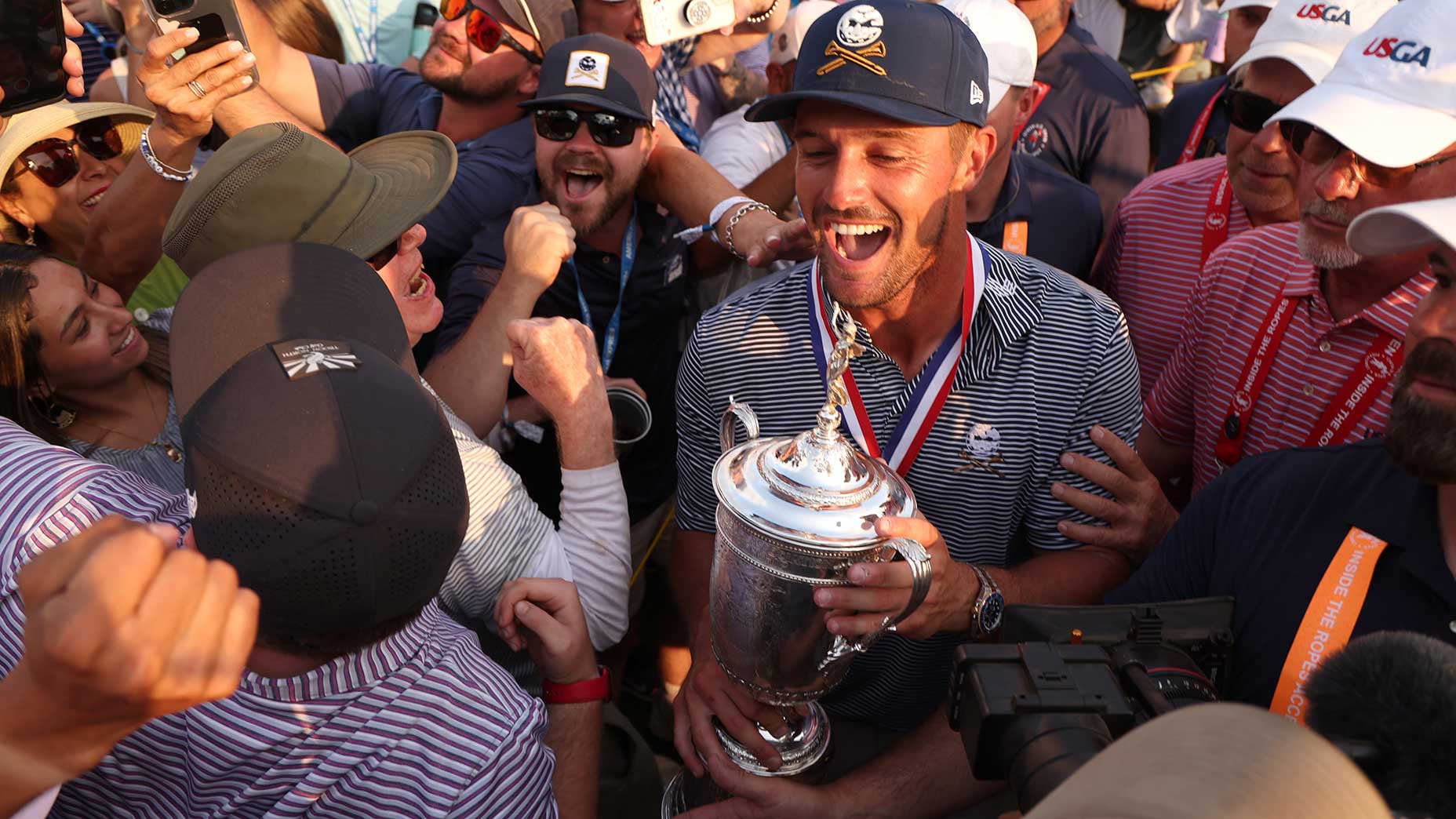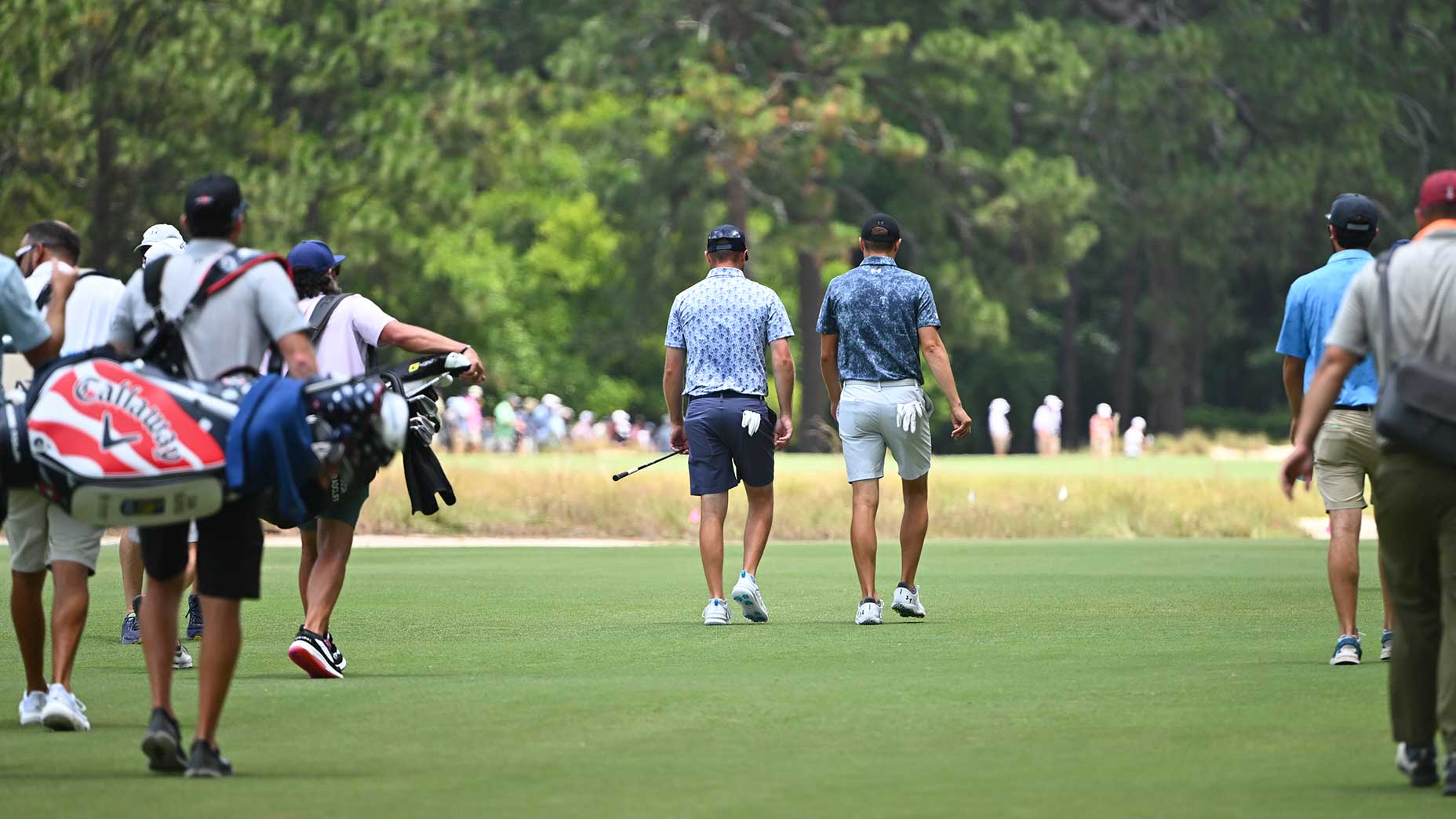Colin Prater and Jordan Spieth walk down the fairway during a U.S. Open practice round.
Getty Images
PINEHURST, N.C. — There is one way to win, several ways to be a winner and many ways a heart can break. At the United States Open, you get it all.
As Bryson DeChambeau won the U.S. Open with a brilliant sand save on Sunday on the 72nd hole, Rory McIlroy watched on a TV from the scoring area, a small room off the newly built tunnel below Pinehurst No. 2’s sprawling clubhouse.
Minutes earlier, McIlroy lipped out a par putt from 3 feet, 9 inches on the 18th hole. Two holes before that, he missed one from inside 3 feet. Making one would have been good for a playoff. Making both would have ended his grueling decade-long major drought.
McIlroy stood hands on hips, hat barely resting on top of his head, as he watched DeChambeau line up the winning 4-footer. McIlroy’s golf ball was still in his right pocket, just in case he needed it for a playoff. He would not.
As DeChambeau raised his arms in victory, McIlroy grimaced, turned and walked away. His caddie, Harry Diamond, picked up the bag and followed. McIlroy opened the door, turned around and took one last look at the TV screen — as if to make sure his eyes didn’t deceive him — then disappeared into the tunnel.

Getty Images
At the U.S. Open, the sport’s ultimate test of attrition, mental fortitude and otherworldly skill, there is one winner and 155 losers.
Tiger Woods did not win this week. He shot 74-73 to miss the weekend. He was battling the cut line late on Friday, missed a couple of good birdie looks late and was sent home. There was no morale victory for the 15-time major champion, despite his limited playing schedule.
“It’s one of those things where in order to win a golf tournament, you have to make the cut,” Woods said Friday night. “I can’t win the tournament from where I’m at, so it certainly is frustrating.”
Scottie Scheffler — shockingly! — did not win this week. He made the cut on the number, never threatened over the weekend and tied for 41st. He couldn’t make a putt, couldn’t see the break and vowed to do more work on the greens before the Open returns here in 2029.
Justin Thomas did not win this week. He shot 77-74 for his fourth missed cut in his past five major starts. On Saturday, he was still here, stepping out of a courtesy Lexus just after noon. He wore gym clothes and carried a duffle bag into the players’ locker room. He had work to do.
Patrick Cantlay and Tony Finau did not win this week. They tied for third, good for their best U.S. Open finishes of their career. Finau shot three under on the back on Sunday and said he was proud of the way he fought and has a lot of positives and confidence gained moving forward. Cantlay said it was good to be in contention despite falling short. But they are both still majorless.
McIlroy did not win this week. He bogeyed three of the final four holes to go winless in his 37th straight major. His car turned out of the parking lot without speaking to the media. He’s had major heartbreak before, but it’s doubtful any had hurt like this.
DeChambeau did win this week, and you could argue he won before he even won. And when he did win, he won an 18-inch, sterling silver trophy and $4.3 million. But even before all that on Sunday night, he had won the fans.
Years ago, he was a controversial figure in the golf world. He feuded with Brooks Koepka. He got into an altercation with a fan in 2021 and even kicked some out that same year. He went months without speaking to the media. When he went to LIV in 2022, he was battling injuries and form. But in the past year — and especially at major championships — he’s reinvented himself.
At Pinehurst, he dazzled, entertained, joked, signed autographs and high-fived. The crowd fed off it, too. After he won on Sunday night, he let everyone in the grandstand touch the trophy.
“Just thinking back three years ago, the landscape was a lot different,” DeChambeau said Saturday night. “I tried to show everybody who I was. I didn’t do it the right way and could have done a lot of things better.”

Josh Berhow
Of course, you can still win if you lose.
The range here at Pinehurst is enormous. It’s split into two sections, with players using The Cradle short course as their play field. At 1:45 p.m. on Sunday, it was buzzing with U.S. Open contenders — DeChambeau, Cantlay, McIlroy, Pavon, Finau.
At 2:10 p.m., it was empty, save for one player.
Amateur Colin Prater, a 29-year-old freshman biology teacher, had his stand bag propped up and alignment stick out. He shot 79-78 and missed the cut by 12. He was practicing and over-emphasizing his takeaway. Sometimes his arms get stuck behind him, which is no good. He was dressed like he was ready for a tee time as he blasted balls into the hazy North Carolina sky.
On Monday, he’ll fly back to Colorado Springs, Colo., where he lives with his wife, Madi, and their 20-month-old daughter, Blake. Their second child is on the way.
Prater was one of 73 pros or amateurs who earned a spot in the U.S. Open via the qualifying system that begins at the local level and culminates at final qualifying. Nearly 10,000 golfers battle for those spots. He qualified for his first U.S. Open via the Bend, Ore., site, where he shot 68-73 to earn one of two spots.
He doesn’t practice much these days, being a dad and a teacher and all, but when he does they are more focused. Forty minutes on lag putting here. Or 30 minutes on 25-yard bump-and-runs there.
He took a break from his range session to explain what he was up to.
“Isn’t the goal that you are trying to get a little better every day?” he says. “I like the quote of, ‘I want to get 1 percent better every day.’ So that’s what I really tried to work on the last couple of years.”
On Sunday, Prater spoke glowingly of his favorite moments of the week. Playing with Jordan Spieth and Sam Burns and Wyndham Clark. Saying “What’s up JT?” to Justin Thomas every single time they crossed paths. The tip McIlroy gave him regarding how to tackle Pinehurst (“fairways and greens”). He said he and his caddie will have memories to talk about for 30 years.
It was a hot, sticky, wonderful, beautiful, perfect day for golf on one of America’s most iconic golf courses, and from a tiny corner of the range, Prater was truly grateful. A few hundreds yards from him, the leaders were about to tee off, trying to win golf’s national championship. Others on the course had different battles to win — finish top 10 and get invited back, beat last year’s finish or maybe just shoot under par. Prater looked out across the property and extended his arm.
“The aura here,” he said, before pausing, “it’s just so frickin’ cool.”
There would be only one person to hoist the trophy hours later. It wouldn’t be Prater or McIlroy or 153 others in the field. But they didn’t all necessarily lose.
“I mean, I know I’m a winner this week,” Prater said. “I think the question has to do with perspective. Like, what is your perspective? It’s an individualist question as far as what was everyone’s goal. If you are a top-30 player in the world your goal is to win. I know for the amateurs, I’m sure most of them were thinking they just want to play golf for four days.
“But from my perspective,” he concluded, “being here, just absorbing this whole week, this has been a win.”
Minutes later, the final U.S. Open pairing teed off. Prater went back to work on the range, sweat dripping off his cap, trying to get 1 percent better.


